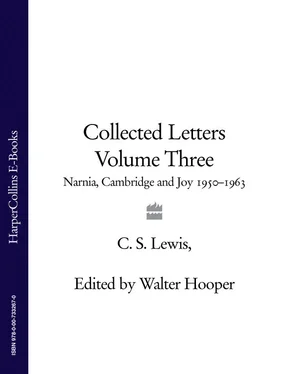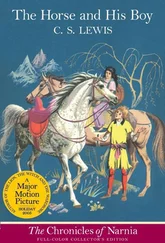*Yet oh! How I sympathise with him! God is such an Intruder! We must deal with them v. tenderly.
137 Francis of Assist: Early Documents , 3 vols., ed. Regis J. Armstrong OFM Cap., J. A. Wayne Hellmann OFM, Conv., William J. Short OFM (New York: New City Press, 2000), Vol. II: The Founder , ‘The Legends and Sermons about Saint Francis by Bonaventure of Bagnoregio (1255-1267)’, p. 564: ‘[Francis of Assisi] taught his brothers…that they should master their rebellious and lazy flesh by constant discipline and useful work. Therefore he used to call his body Brother Ass, for he felt it should be subjected to heavy labor, beaten frequently with whips, and fed with the poorest food.’
138This was the Italian translation of Out of the Silent Planet , published as Lontano dal Pianeta Silenzioso , trans. Franca Degli Espinosa (Milan and Verona: Mandadori, 1951).
139See the biography of Bernard Acworth in CL II, p. 632n. Acworth was founder and president emeritus of the Evolution Protest Movement.
140Bernard Acworth, This Progress: The Tragedy of Evolution (London: Rich & Cowan, 1934).
141The tomb of Boethius (AD 480-524) is in the Church of S. Pietro Ciel d’Oro at Pavia.
142The edition Lewis used was The Consolation of Philosophy, with the English Translation of ‘I.T.’ (1609), rev. H. E Stewart (London: Heinemann, Loeb Classical Library, 1918).
143Kinter had asked about a sentence in the preface of Lewis’s That Hideous Strength: A Modern Fairy-Tale for Grown-Ups (London: John Lane, 1945; HarperCollins, 2000), p. xii: ‘Those who would like to learn further about Numinor and the True West must (alas!) await the publication of much that still exists only in the MSS. of my friend, Professor J. R. R. Tolkien.’
144Max M”uller, The Science of Language , 2 vols. (London: Longmans, 1891), Vol. II, p. 454.
145George MacDonald, Sir Gibbie (1879), ch. 47: ‘the time for speaking comes rarely, the time for being never departs.’
146Wendell W. Watters, MD, a Canadian psychiatrist, was Professor of Psychiatry at McMaster University, Hamilton, Ontario, Canada. He was the author of Deadly Doctrine: Health, Illness, and Christian God-talk (1992).
147This letter first appeared in L as ‘To A CRITICAL BUT CHARITABLE READER’, and was incorrectly dated 12 September 1951.
148Dr Watters’s objection to Christ’s ‘unfair advantage’ was occasioned by Lewis’s Broadcast Talks , Bk. II, ch. 4. When revising the talks for Mere Christianity (London: Bles, 1952; HarperCollins, 2002), Lewis added two paragraphs to the end of Book II, Chapter 4, in which he used the example given here: ‘I have heard some people complain that if lesus was God as well as man, then His sufferings and death lose all value in their eyes, “because it must have been so easy for him”…If I am drowning in a rapid river, a man who still has one foot on the bank may give me a hand which saves my life. Ought I to shout back (between my gasps) “No, it’s not fair! You have an advantage! You’re keeping one foot on the bank”? That advantage—call it “unfair” if you like—is the only reason why he can be of any use to me. To what will you look for help if you will not look to that which is stronger than yourself?’ (pp. 58-9)
149Geoffrey Bles was pressing Blamires to persuade Lewis to write a preface for Blamires’s English in Education (London: Bles, 1951).
150i.e., the preface he was writing for D. E. Harding’s The Hierarchy of Heaven and Earth .
151See the biography of Herbert Palmer, poet and literary critic, in CL II, p. 678n.
152John Milton, Prose Works , with preliminary remarks and notes by J. A. St John, 5 vols. (London: Bohn’s Standard Library, 1948-53).
153Herbert Palmer, ‘English Poetry: 1938-1950–I’, The Fortnightly , CLXX (September 1951), pp. 624-8; ‘English Poetry: 1938-1950–II’, ibid. (October 1951), pp. 695-700; ‘English Poetry: 1938-1950–III’, ibid. (October 1951), pp. 768-74.
155i.e., The Problem of Pain .
156Ashley Sampson of Geoffrey Bles, The Centenary Press, had asked Lewis to contribute a book on pain to the Christian Challenge series. See CL II, p. 289n.
157 The Problem of Pain , ch. 1, p. 15: ‘The Christian faith…has the master touch–the rough, male taste of reality’
158‘C. S. Lewis: 1898-1963’, Bodleian Library, MS. Facs. d. 290.
159Since the thirteenth century there have been many versions of the legend of the Wandering Jew. In essence the legend recounts how a Jew chided Christ as he bore the cross to Calvary and was thereafter condemned to wander about the world until Christ’s Second Coming.
160Bunyan, The Pilgrim’s Progress , Part I, pp. 55-6.
161United Nations Organization.
16225 April.
163Hebrews 11:1: ‘Faith is the substance of things hoped for, the evidence of things not seen.’
164Psalm 8:2; Matthew 21:16.
165Numbers 22:24-31.
166Philippians 4:4.
167Colossians 2:14-5.
TO EDNA GREEN WATSON (BOD): TS
REF.52/9
Magdalen College,
Oxford.
2nd January 1952.
Dear Mrs. Watson,
Very many thanks for your kind present of the cake, which has just arrived in good condition; good external condition that is, for it will not be opened until I get it out to my house this evening, where it will be received with enthusiasm. I often hear laments about the difficulty of getting cake making materials, so you can imagine how much pleasure it will give.
It will also help to distract attention from all the news in the papers about the shortages which are expected in 1952: news which is not rendered any the more palatable by Churchill’s assurance that when he gets back from your country, 1 and meets Parliament, he will have several proposals to make which ‘will be very unpleasant for all of us.’ But we are in hopes that his treatment will differ from Atlee’s in being like the pain after you have had a tooth out–getting less every day—whereas under the late government we were shirking going to the dentist and the pain was getting worse every day. 2
With many thanks, and all good wishes for the New Year,
yours sincerely,
C. S. Lewis
TO RUTH PITTER(BOD):
Magdalen etc
Jan 8th. 1952
Dear Miss Pitter
May Maleldil send you a good year. 3 Of course use those Spenserian stanzas as you wish. 4 I think your idea of the sheepdog-trial for readers is excellent.
The poem of yours which I didn’t like was the one about the enamoured earwig and the lady: 5 and it all comes of mere idiosyncrasies of mine, (a.) My imagination goes easily to humanised mammals but stops dead at humanised insects, (b.) I can’t bear the least suggestion (however sportive) of love affairs between different species or even between children. That is one of the many things which for me sinks Tom Sawyer so immeasurably below the divine Huckleberry . But as I can’t give any reason for the second—I think I could for the first–this doesn’t help you v. much. I suspect it originates with the mingled embarrassment and nausea evoked in oneself as a child by grown-up jokes of an arch character at childrens’ parties.
Isn’t Herbert–? 6 well: one can only say well . I am glad you are swimming in poetry and cannot help hoping great things.
Yours most sincerely
C. S. Lewis
TO EDWARD A. ALLEN (W): TS
REF. 52/28
Magdalen College,
Oxford.
8th January 1951 [1952].
My dear Mr. Allen,
Читать дальше












